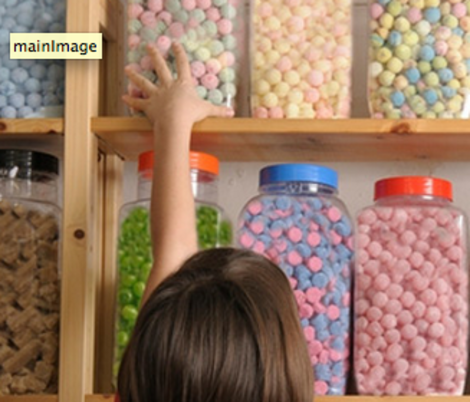Sticky Fingers: Why Do Kids Really Steal?

It seems my four-year-old has sticky fingers. It started a few months ago. I noticed one day after school - as I was holding my son's pants upside-down, dumping pounds of sand into the kitchen trash - a shiny, puffy, diamond-shaped sticker tumbled out in the dirt avalanche. I didn't think much about it until it happened again, this time with a collection of tiny gem-like pieces and a plastic cow, clearly lifted from school.
"What's this, buddy?" I asked.
"Treasure," he replied, matter-of-factly.
"From school?"
He hesitated for a second and nodded.
"Neat," I said, trying to think on my feet. "Well, we can't bring home things that live at school. Let's put this by the door so we don't forget to take it back tomorrow." He agreed. Problem solved. Except the very next week, another load of booty arrived in his sweatshirt pocket, and this time he seemed to be a step ahead of me with a cover story. It was a "gift" from a friend at school. Since then, colored sticks and bugs and (oddly) a D battery have hitched a ride home from school in his pockets.
The behavior stumps me a little, because my son is not a rule-breaker by nature. Swiping plastic farm animals isn't exactly grand larceny, but it feels a little strange nonetheless.
Related: The 7 dumbest things I thought before I had a kid
When I asked around, I found the pattern of kids taking coveted objects to be pretty typical; my friends piped up with similar stories. I looked around online for commentary, and most people seemed to attribute the looting phenomenon to limited impulse control and a lack of conscience; little kids can't help but take tantalizing items and don't have the sense of right and wrong to know any other way. I can see this is true of toddlers, who might cart home a friend's toy or an irresistible box of crayons without a clue that it's not okay to do so. But it doesn't explain my son, who has good powers of self-control. And while kids his age may not grasp the long-term implications of their actions, they do understand basic social rules.
I mentioned this to my son's preschool teacher, and she said my son was conducting an important experiment. Little kids need to draw connections between the domains in their lives (school, home, friends' homes, places they travel to, and so forth), she explained. When my son comes home with a token, it's akin to taking a piece of school home with him - bridging the gap between his two most familiar and important places. She also agreed that four-year-olds understand right from wrong in many instances, but it's still a work in progress, so he could be testing out concepts like ownership and boundaries.
To me, the harmless heisting also seems related to the "treasure" fascination most kids have at this age. My son, like many fellow preschoolers, collects things. Pieces of glitter, small rocks and pebbles from a walk, bottle caps - these possessions hold a special importance to him. Young kids seem to attach meaning to the objects they find and accumulate (making treasure chests and piggy banks especially intriguing). Perhaps it's an evolutionary adaptation - the hunter-gatherer instincts telling our little ones to forage and pack valuables away.
Whatever the reason, taking objects might be a brow-furrowing behavior, but for young kids, it's not a worrisome one; in my experience, it's a developmental phase that will pass. That's not to say that stealing is never a sign of a bigger problem. When I ask a colleague who works with adolescents about this, she tells me that for older children and teens, stealing can be an expression of anger, a need for instant gratification, a lack of impulse control, or all of the above. On the clinical spectrum, stealing "items of nontrivial value" is associated with conduct disorder, a psychiatric diagnosis for children and teens with serious, long-standing behavioral struggles. If stealing is accompanied by aggression, cruelty, and destroying property, for example, it could be a sign of a larger issue.
Back in the land of plastic cows, however, toddler and preschool pinching is not yet an expression of a problem. Your average child who stuffs a friend's toy in mom's purse is likely to be experimenting. In fact, I see it as an opportunity - fodder for conversation. When I debriefed my son on the gems and animals, I stayed neutral (I'd never want to shame him or make an emotional deal about this) when I stated the facts about how "things from school live at school." It could also spark a discussion of how a fellow classmate would feel if he went to play with the objects and couldn't find them, which is good practice with empathy and taking another person's perspective.
On the high side, the experience has given me inspiration for a Christmas present. I'll be sure to get my son a piggy bank or special chest this year - a place for him to store all his legitimately obtained and gifted treasures.
- By Heather Turgeon
For the 7 habits of highly annoying toddlers, visit Babble!
MORE ON BABBLE
Indigestion, Yo Gabba Gabba! ... and 14 more things I've forgiven my children for
12 unexpected ways life changes after kids
7 things you should NEVER say to a kid
12 things your kids MUST see you do


